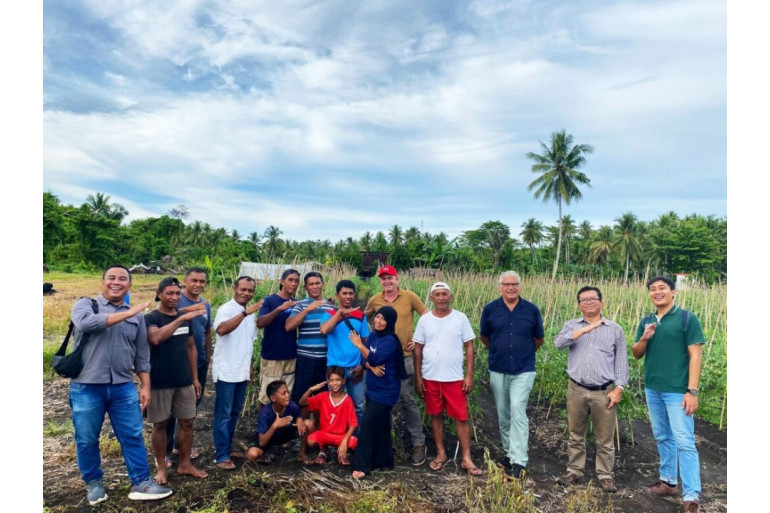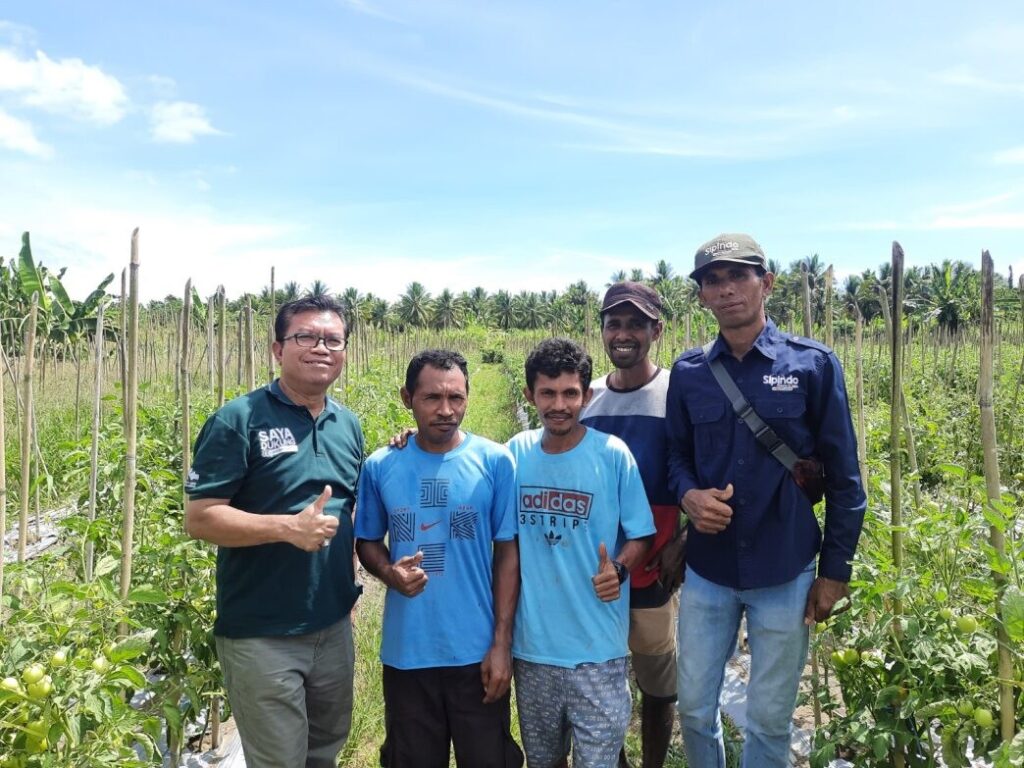

In January 2024, I had the privilege of being part of a meaningful journey alongside Stuart Morris (Director of East-West Seed Knowledge Transfer Foundation), Flip Van Koesveld (Advisor to the Board of Trustee at East-West Seed Knowledge Transfer Foundation), and the dedicated Management Team of YBTS, Edwin S. Saragih (Chairman) and Arga Wisnu Pradana (Assistant Manager). Our mission aimed to connect with and learn from local farmers, initiating with a visit to Pak Opan’s farm, one of YBTS-assisted farmers in Pilowo Village, South Morotai Subdistrict, Morotai Island.
Something captivating unfolded during our visit, Pak Opan and Ibu Susi have emerged as influential figures in the Pilowo Village community, promoting the cultivation of horticultural crops. Currently, they are nurturing the servo variety of tomatoes by PT East West Seed Indonesia (Cap Panah Merah). Moreover, they diligently record the financial inflows and outflows throughout the cultivation process. We expressed satisfaction with their efforts at every stage.

Our next stop took us to the fields of Pak Yasin Kahe in Ngidiho Village, North Galela Subdistrict, North Halmahera. During our visit, Pak Yasin was busy cultivating the servo variety of tomatoes, fetching a high market price ranging from Rp 40,000-45,000 per kilogram, underscoring its remarkable profitability. Aside from tomatoes, Pak Yasin also thrives in coconut cultivation for copra production. When Flip and Stuart asked about the comparative profitability of these ventures, Pak Yasin promptly affirmed, “Without a doubt, cultivating horticultural crops.” Laughter echoed as we collectively reveled in his response. Pak Yasin stood tall as a source of inspiration for the local youth in the surrounding community.

The exploration continued with a visit to the farmland of Pak Yani Anu, the committed chairman of Pomakomote farmers’ group. This farmers’ group has been under YBTS guidance since 2015, and presently, their cultivated land spans an impressive 4-6 hectares. The crops in their care include amara watermelon of Cap Panah Merah, servo tomatoes, and melons. Their unique farming practices include collective management of the substantial 4-6 hectare plot, intricately mapped with each member allocated specific section. Engaging in weekly discussion among farming groups is a regular practice, and Pak Yani emphasized, “We always welcome new ideas.” During our visit, Stuart and Flip provided guidance on the prudent use of insecticides and herbicides.

Our fourth stop led us to Pak Munir fields in Mekar Village, Kao Teluk Subdistrict, North Halmahera. Pak Munir tends to a variety of crops, including corn, tomatoes, peanuts, and chili. What capture our interest was Pak Munir’s recent adoption of crop rotation. He shared, “I used to grow tomatoes, but now I’ve shifted to growing peanuts.” This shift fascinated us as it signifies a thoughtful crop rotation strategy, benefiting both soil and environmental conditions. Stuart, Flip, and YBTS were pleased to hear this, acknowledging the positive contribution of peanuts in enriching soil fertility through nitrogen fixation.

Reflecting on our journey to Morotai Island and North Halmahera, there are valuable insight to glean:
In the end, our journey was not just about visiting farmers; it was a celebration of resilience, community, and the shared passion for sustainable agriculture. Each visit unfolded a new chapter, revealing the intricate balance between traditional wisdom and innovative practices. The echoes of laughter, the exchange of insights, and the shared commitment to sustainable farming practices will linger in our hearts, reinforcing our dedication to fostering a resilient and thriving agricultural community.
(SDC/NNN)